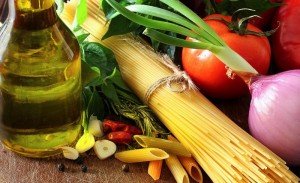Mediterranean diet, what are its secrets?
 In an effort to catalog and understand what the true Mediterranean diet is, and why the Mediterranean diet gives so many health benefits, we risk being overwhelmed by the definitions and low-carb versus low-fat alignments, and missing something all along the way. After Ancel Keys’ studies on the Mediterranean diet in the 1950s , in fact, the concept of the Mediterranean diet went around the world and became synonymous with health: according to Keys, the populations of the Mediterranean area, in fact, ate a diet ad high in carbohydrates and low in fat, especially saturated. According to him, this explains the low cholesterol and longevity of the Greeks or Italians, especially in the south. According to Keys, the Mediterranean diet was therefore a diet rich in whole grains and legumes, vegetables and fruit, olive oil or olives, fish more than meat, dried fruit and at most a few glasses of good wine.
In an effort to catalog and understand what the true Mediterranean diet is, and why the Mediterranean diet gives so many health benefits, we risk being overwhelmed by the definitions and low-carb versus low-fat alignments, and missing something all along the way. After Ancel Keys’ studies on the Mediterranean diet in the 1950s , in fact, the concept of the Mediterranean diet went around the world and became synonymous with health: according to Keys, the populations of the Mediterranean area, in fact, ate a diet ad high in carbohydrates and low in fat, especially saturated. According to him, this explains the low cholesterol and longevity of the Greeks or Italians, especially in the south. According to Keys, the Mediterranean diet was therefore a diet rich in whole grains and legumes, vegetables and fruit, olive oil or olives, fish more than meat, dried fruit and at most a few glasses of good wine.
A huge simplification that led in the following years to the low-fat philosophy and the battle against cholesterol : eggs are bad, cheeses are the devil, saturated fats in meat are bad, butter in the Mediterranean diet does not exist, not even lard, the Mediterranean diet is basically vegetarian, and so on. But it is enough to be Italian or to know enough about Italy through its culinary tradition to know that this is not the case at all .
Our country is in fact rich in traditions and recipes in which there are lard or lard, aged cheeses, dishes that combine legumes and pasta with bacon, Sunday pastas enriched with meat sauces and cheeses, hearty desserts, fried foods.
Think of parmigiana, baked pasta, pasta and beans. Think of the fact that in Naples lard is used, and in Sardinia, where one of the longest-lived populations of Italy is to be found, a lot of goat cheese is eaten. In other regions lamb is eaten, in the south horse meat is not disdained, not to mention the widespread use of offal and less noble parts of the animal in some homemade preparations. This obviously does not mean that we disdain olive oil, vegetables and the like,but only that the Mediterranean diet at least in Italy is not a reinterpretation of the Okinawa diet, and has never been an almost vegetarian or low-fat diet.





























+ There are no comments
Add yours